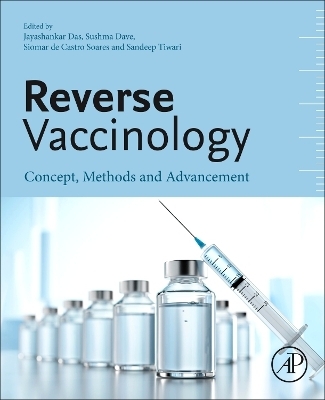
Reverse Vaccinology
Academic Press Inc (Verlag)
978-0-443-13395-4 (ISBN)
This book is split into three sections: the first, Concept, brings the basis of reverse vaccinology, vaccine antigen discovery, and subunit vaccine; the second, Tools and Methods, describes immunoinformatic, proteomics for epitope-vaccine design, databases, network analysis, machine learning, and NGS-driven antigen screening technology; and the last one, Disease Case Study, discusses real-world examples in the development of new vaccines for diverse diseases.
It is a valuable resource for bioinformaticians, researchers, students, and members of the biomedical and medical fields who want to learn more about a new and agile process for the development of new vaccines.
Dr. Das received his PhD in biotechnology and served as a Scientist at the IBSD, DBT, Government of India. He is the Founder and CEO of Valnizen which deals with regulatory documents and healthcare compliances and support services to African and southeast Asian countries. He has served as a Joint Director of the Gujarat State Biotechnology Mission, DST, and Joint Director to Gujarat Biotechnology Research Centre, DST, both from the Government of Gujarat. He has served as a Director of the Savli Technology and Business Incubator, DST, Government of Gujarat, India. He was actively involved in the development and implementation of various policies and action plans like biotechnology policy, innovation policy, interpole disaster management policy, start-up policy for many universities and governments. His research team is involved in addressing societal challenges via cutting-edge research, namely, the development of molecular diagnostics for infectious diseases, the development of universal vaccine candidate for emerging diseases, the development of miRNA-based targeted therapeutics, and artificial intelligence in healthcare applications. Dr. Sushma Dave received a master of science and PhD in analytical, electrochemistry, and environmental chemistry from the Biosensor Lab in the Chemistry Department of Jai Narayan Vyas University, Jodhpur. She is involved continuously in the field of higher education teaching pure, applied chemistry, cheminformatics, nanotechnology, electrochemistry, biology, solid waste management, wastewater treatment, and environmental chemistry to students of engineering and basic sciences. She also served as a Research Associate in the Soil Biochemistry and Microbiology Division, CAZRI, Jodhpur. She has published and presented over 50 papers in international and national journals, conferences and participated in various workshops and training programs. Her areas of interest are electrochemistry, biosensors environmental science, nanotechnology, biochemistry, cheminformatics, immunoinformatics, and drug repurposing. Dr. Soares obtained his MSc and PhD in genetics from the Federal University of Minas Gerais with 1-year experience in the Center for Biotechnology (CeBiTec) of Universität Bielefeld. He obtained a second PhD and postdoc research in bioinformatics. He was a Senior Bioinformatics’ Researcher at the Official Laboratory of the Ministry of Fisheries. Dr. Soares is currently Secretary of the Southeast Regional of the Brazilian Society of Genetics (2017–present), Substitute Coordinator of the Bachelor’s in Biomedicine of UFTM (2017–present), Director of the Department for the Development of Research and Technological Innovation of UFTM (2019–present), and Affiliate Member of the Brazilian Academy of Sciences (2018–present). His areas of expertise are molecular genetics, genomic sequencing, and microbial comparative genomics, mainly focused on pan-genomics, the role of pathogenicity islands and virulence factors in genome plasticity, phylogenomics, molecular epidemiology, reverse vaccinology, and software development (Perl and Java languages). Dr. Tiwari obtained his BSc from Deen Dayal Upadhyaya Gorakhpur University, MSc in bioinformatics from Devi Ahilya University, and PhD in bioinformatics from the Department of Genetics, Ecology and Evolution, Federal University of Minas Gerais, Brazil. He is a Guest Associate Editorial Board of Frontier in Genetics and frequently serves as an external reviewer for PeerJ and Frontiers. His main areas of expertise are molecular genetics, genomic sequencing, and comparative genomics of microorganisms, with a focus on pan-genomics, genomic plasticity in the identification of pathogenicity islands and virulence factors for drug discovery, phylogenomic, molecular epidemiology, reverse vaccinology, and immunoinformatic.
1. Personalized vaccinology
2. Novel vaccine adjuvants formulations and mechanisms of action
3. Technologies to measure vaccine immune response against infectious diseases
4. Vaccines for cancer
5. Vaccines against autoimmune diseases
6. Vaccines for allergy
7. Virus vaccine production using cell-based technology
8. Dendritic cell-based cancer vaccine production
| Erscheinungsdatum | 22.08.2024 |
|---|---|
| Verlagsort | San Diego |
| Sprache | englisch |
| Maße | 152 x 229 mm |
| Gewicht | 620 g |
| Themenwelt | Mathematik / Informatik ► Informatik ► Theorie / Studium |
| Informatik ► Weitere Themen ► Bioinformatik | |
| Naturwissenschaften ► Biologie ► Genetik / Molekularbiologie | |
| ISBN-10 | 0-443-13395-6 / 0443133956 |
| ISBN-13 | 978-0-443-13395-4 / 9780443133954 |
| Zustand | Neuware |
| Informationen gemäß Produktsicherheitsverordnung (GPSR) | |
| Haben Sie eine Frage zum Produkt? |
aus dem Bereich


